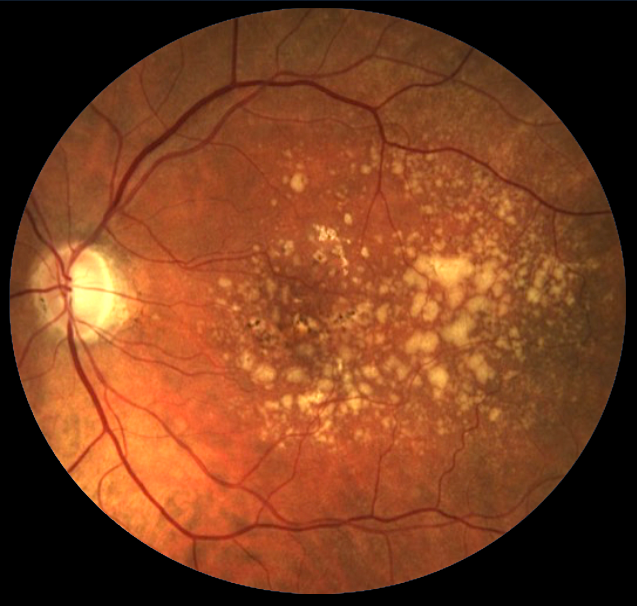 |
Ketone production during intermittent fasting can ameliorate inflammatory processes and may reduce AMD risk. Photo: NEI. Click image to enlarge. |
A recent health trend, intermittent fasting, was shown to be associated with a reduced risk of age-related macular degeneration (AMD) in a new study done on an elderly Korean population. Compared with participants who ate breakfast, those who skipped the meal had a decreased risk of AMD, a finding especially evident in individuals who were younger than 70, obese and/or of urban residence.
Skipping breakfast is one type of intermittent fasting regarded as time-restricted feeding (an eight- to 12-hour feeding window and 12 to 16 hours of fasting), as nothing is eaten between dinner and lunch the next day. To determine how adopting this dietary change could potentially influence AMD risk, researchers looked at survey data on meal frequency as well as fundus photography of 4,504 subjects over the age of 55. The cohort was divided into two groups based on weekly breakfast consumption: intermittent fasting (nearly zero times per week) and non-fasting (five to seven times per week).
AMD was identified in roughly one in four participants in the study, with a prevalence of 14.2% in the intermittent fasting group and 25.6% in the non-fasting group. The intermittent fasting group had a lower AMD risk compared with the non-fasting group (odds ratio: 0.41). In addition, those who were younger than 70, obese or lived in an urban location had a decreased risk with odds ratios of 0.36, 0.67 and 0.44, respectively. Two additional risk factors for AMD were older age (odds ratio: 1.06) and higher serum HDL-C level (odds ratio: 1.01).
The reasons are still being investigated as to why intermittent fasting seems to have a neuroprotective effect on the retina, though it has been demonstrated by in vivo and in vitro models. The researchers speculate that because obesity was shown to be a risk factor for AMD in this study, the reduction of overall daily food intake by cutting out breakfast may be one explanation for why this lifestyle change seems to aid in disease protection.
“The intermittent fasting group consumed lower daily calories, carbohydrates, proteins and dietary supplements such as N-3 fatty acid, vitamin A and beta-carotene than the non-fasting group,” they pointed out in their paper on the study. They also explained, “Intermittent fasting increases circulating ketone levels, which have a variety of favorable aspects including amelioration of oxidative stress and inflammatory processes. Thus, the benefit of intermittent fasting on AMD risk might be more prominent in individuals with more systemic inflammation due to obesity than in individuals of normal weight.”
After adjusting for confounding factors, the data showed that skipping breakfast five to seven days a week reduced the risk of AMD. “This population-based study suggested important evidence to adapt time-restricted feeding using breakfast-skipping as a clinical strategy to modulate the development and prognosis of AMD,” the researchers concluded.
Choi EY, Kim M, Lee CS, et al. Intermittent fasting is associated with a decreased risk of age-related macular degeneration. Am J Ophthalmol. June 22, 2022. [Epub ahead of print]. |


